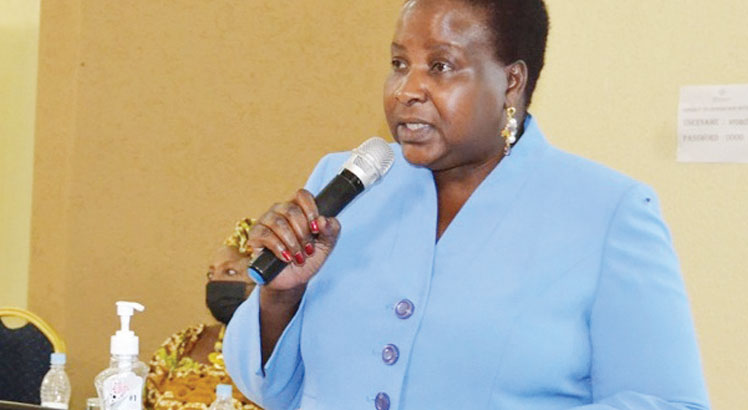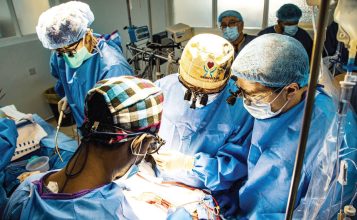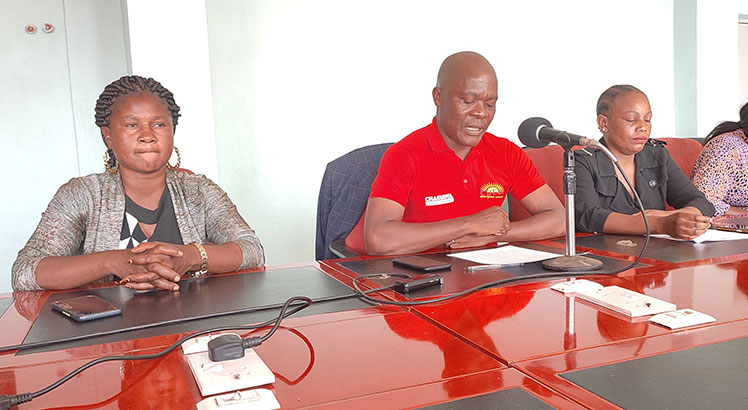Govt steps up Covid-19 restrictions
The Presidential Task Force on Covid-19 on Thursday announced the revival of preventive measures that include restrictions on public gatherings as cases spike amid the new Omicron variant.
Speaking during a press briefing in Lilongwe, Minister of Health Khumbize Kandodo Chiponda, who is also the co-chairperson of the task force, also indicated that frontline civil servants may from January be subjected to mandatory Covid-19 vaccination.

In announcing the new measures to roll out on Monday, the minister said Malawi is currently on level two alert which calls for caution to avoid further spread of the virus.
Said Chiponda: “As communicated last time, our experts have come up with five alert levels and thresholds for the pandemic so as to provide guidance on the measures to be instituted at each level.
“Alert level one represents the lowest magnitude of cases, admissions and deaths, while level five represents the highest magnitude of cases, admissions and deaths. Based on this characterisation and recent data, I would like to inform the nation that we are now in Level two of the pandemic.”
The minister said in addition to the general preventive measures, including the use of face masks in open places, observance of social distance, frequent washing of hands with soap and use of sanitisers, public gatherings including weddings, religious gatherings, sporting activities should not exceed 100 and 250 people for indoor and outdoor activities respectively.
She said political rallies are allowed subject to the specified limitations of 100 persons indoors and 250 persons outdoors and further asked political leaders to refrain from holding rallies.
Chiponda said conveyances by public vehicles such as buses, minibuses and taxis should not exceed 60 percent of available seating capacity.
On travelling, the minister said there is no restriction on entry into Malawi for travellers from all countries, except those from countries that may be classified as high risk.
She said: “However, all travellers should produce a valid negative PCR based test certificate which was obtained from an accredited or designated laboratory in the country of origin within 72 hours of arrival in Malawi.
“In addition, travellers should show evidence of full Covid-19 vaccination at the point of entry. Those without proof of vaccination will be vaccinated at the point of entry.”
The minister, however, expressed worry on the uptake of the vaccines, saying it has not been high enough towards reaching Malawi’s goal of vaccinating at least 60 percent of eligible Malawians by the end of next year. Currently, only about 3.3 percent of the adult population has been vaccinated.
To improve vaccine uptake, Chiponda said draft regulations have been submitted to the Ministry of Justice which will impose mandatory Covid-19 vaccination for certain categories of people including those in the public service in January 2022.
The Public Health Act chapter 34.01 stipulates that the Minister of Health may by notice published in the Gazette declare any area to be a compulsory vaccination area and shall in such notice specify a period within which the vaccination of all unprotected persons dwelling in such area shall take place.
Reacting to the new measures, Health and Rights Education Programme director Maziko Matemba said there is something the country is not doing well when it comes to containing the spread of the virus.
He said: “Positive cases are increasing, positivity rate is increasing and the death rate is increasing, so the task force has observed that we need to do more and come up with the outlined measures which might bring relief to the current situation.
“I am hoping that as a country we will not reach level three or four within a short period of time because if we continue registering high numbers it means we are not doing much to make sure our people are protected.”
However, Matemba warned that mandatory vaccination is in conflict with human rights.
He suggested that Capital Hill should continue reaching out to communities with the right information on vaccination.
Epidemiologist Titus Divala in an interview while commending the government on the new restrictions agreed with Matemba on the importance of keeping vaccination voluntary as mandatory vaccination impinges on people’s rights.
He said: “Under some circumstances, it is justifiable for governments to protect citizens when they are not ready to do so, on their own.
“People, especially those in high risk categories who refuse to get the vaccine should realise that by doing so, they are costing the government millions of kwacha and are putting others at risk.”
Centre for Human Rights and Rehabilitation executive director Michael Kaiyatsa said mandatory vaccination is not a good approach for the government.
He suggests that the government should emphasise on adequate sensitisation for people to come for the vaccines.
According to the ministry, Malawi registered its first cases of the new Omicron variant last week and the number has since increased to 16 after 13 new cases were detected this week.
Chiponda said all Omicron cases are currently under self-isolation.
The variant was first spotted in South Africa in November 2021 and was reported to the World Health Organisation (WHO) on November 24.





